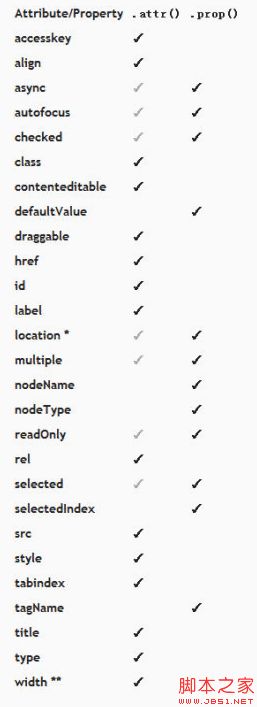获取匹配集合中第一个元素的Property的值
2、
.prop( propertyName, value )
.prop( map )
.prop( propertyName, function(index, oldPropertyValue) )
给匹配元素集合设定一个或多个属性
.prop()和 .attr()区别
下面是关于jQuery1.6和1.6.1中Attributes模块变化的描述,以及.attr()方法和.prop()方法的首选使用
Attributes模块的变化是移除了attributes和properties之间模棱两可的东西,但是在jQuery社区中引起了一些混乱,因为在1.6之前的所有版本中都使用一个方法(.attr())来处理attributes和properties。但是老的.attr()方法有一些bug,很难维护。jQuery1.6.1对Attributes模块进行了更新,并且修复了几个bug。
elem.checked true (Boolean) Will change with checkbox state
$(elem).prop("checked") true (Boolean) Will change with checkbox state
elem.getAttribute("checked") "checked" (String) Initial state of the checkbox; does not change
$(elem).attr("checked")(1.6) "checked" (String) Initial state of the checkbox; does not change
$(elem).attr("checked")(1.6.1+) "checked" (String) Will change with checkbox state
$(elem).attr("checked")(pre-1.6) true (Boolean) Changed with checkbox state
if ( elem.checked )
if ( $(elem).prop("checked") )
if ( $(elem).is(":checked") )
这三个都是返回Boolean值。
为了让jQuery1.6中的.attr()方法的变化被理解的清楚些,下面是一些使用.attr()的例子,虽然在jQuery之前的版本中能正常工作,但是现在必须使用.prop()方法代替:

首先,window或document中使用.attr()方法在jQuery1.6中不能正常运行,因为window和document中不能有attributes。它们包含properties(比如:location或readyState),必须使用.prop()方法操作或简单地使用javascript原生的方法。在jQuery1.6.1中,window和document中使用.attr()将被自动转成使用.prop,而不是抛出一个错误。
其次,checked,selected和前面提到的其它boolean attributes,因为这些attributes和其相应的properties之间的特殊关系而被特殊对待。基本上,一个attribute就是以下html中你看到的:
<input type=”checkbox” checked=”checked”>
boolean attributes,比如:checked,仅被设置成默认值或初始值。在一个checkbox的元素中,checked attributes在页面加载的时候就被设置,而不管checkbox元素是否被选中。
properties就是浏览器用来记录当前值的东西。正常情况下,properties反映它们相应的attributes(如果存在的话)。但这并不是boolean attriubutes的情况。当用户点击一个checkbox元素或选中一个select元素的一个option时,boolean properties保持最新。但相应的boolean attributes是不一样的,正如上面所述,它们仅被浏览器用来保存初始值。
$(“:checkbox”).get(0).checked = true;
// Is the same as $(":checkbox:first").prop(“checked”, true);
在jQuery1.6中,如果使用下面的方法设置checked:
$(“:checkbox”).attr(“checked”, true);
将不会检查checkbox元素,因为它是需要被设置的property,但是你所有的设置都是初始值。
然而,曾经jQuery1.6被释放出来的时候,jQuery团队明白当浏览器仅关心页面加载时,设置一些值不是特别的有用。所以,为了保持向后兼容性和.attr()方法的有用性,我们可以继续在jQuery1.6.1中使用.attr()方法取得和设置这些boolean attributes。
最普通的attributes是checked,selected,disabled和readOnly,但下面是jQuery1.6.1支持的使用.attr()动态地取得和设置boolean attributes/properties的完整列表:
autofocus, autoplay, async, checked, controls, defer, disabled,
hidden, loop, multiple, open, readonly, required, scoped, selected
还是建议使用.prop()方法来设置这些boolean attributes/properties,即使这些用例没有转换成使用.prop()方法,但是你的代码仍然可以在jQuery1.6.1中正常运行。
下面是一些attributes和properties的列表,正常情况下,应该使用其对应的方法(见下面的列表)来取得和设置它们。下面的是首用法,但是.attr()方法可以运行在所有的attributes情况下。
注意:一些DOM元素的properties也被列在下面,但是仅运行在新的.prop()方法中

*例如: window.location
**如果需要在(if needed over) .width()
.attr()和.prop()都不应该被用来取值/设值。使用.val()方法代替(即使使用.attr("value","somevalue") 可以继续运行,就像1.6之前做的那样)
3、首选用法的概述
.prop()方法应该被用来处理boolean attributes/properties以及在html(比如:window.location)中不存在的properties。其他所有的attributes(在html中你看到的那些)可以而且应该继续使用.attr()方法来进行操作。
上面的概述已经描述的够清楚了,我也没有必要再总结了。
参考文献:
http://hxq0506.iteye.com/blog/1046334